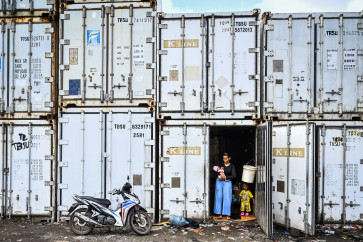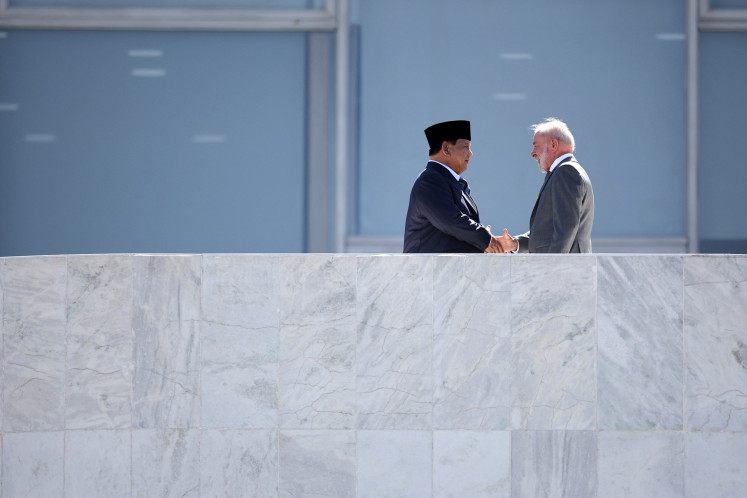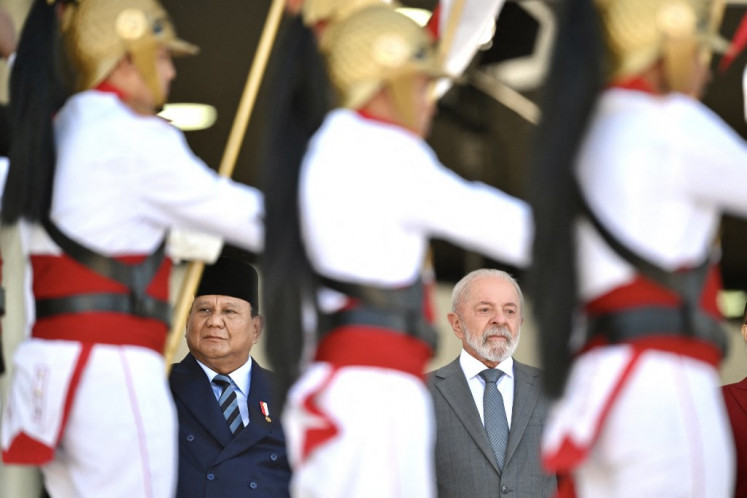Popular Reads
Top Results
Can't find what you're looking for?
View all search resultsPopular Reads
Top Results
Can't find what you're looking for?
View all search resultsDirect elections under threat
The government and several parties in the ruling coalition are toying with the idea of abolishing direct regional elections and giving regional legislative councils (DPRD) the authority to elect regional heads, citing concerns over money politics
Change text size
Gift Premium Articles
to Anyone
T
he government and several parties in the ruling coalition are toying with the idea of abolishing direct regional elections and giving regional legislative councils (DPRD) the authority to elect regional heads, citing concerns over money politics.
While direct regional elections have been championed as being vital to Indonesia’s democracy following the fall of the New Order regime, the government has considered taking voting power away from the public on the grounds that local elections have too many negative consequences, a move welcomed by several parties in the ruling coalition.
Home Minister Tito Karnavian said the government planned to evaluate whether direct regional elections, held since 2005, should be continued.
“I’m questioning whether the current regional election system is still relevant after 20 years. It has many benefits in terms of democratic participation, but there are also disadvantages,” Tito told journalists at the House of Representatives compound in Senayan, Central Jakarta, recently.
Tito added that the current system was prone to money politics, saying it was not a surprise that many regional heads had been arrested for corruption, as the “political dowry” required to run as a regional head candidate could total as much as Rp 30 billion (US$2.14 million).
“There is the potential that almost all regional heads could be involved in corruption. Imagine if they spend Rp 30 billion to 50 billion [to run in a regional election]. While their salary is only, let’s say Rp 200 million per month [...] It’s a loss right?” the former National Police chief said.
The government will review the negative and positive impacts of the direct regional election system by creating a democracy index of each region. Tito also argued that residents in remote areas did not care about the programs regional heads campaigned on.
Akmal Malik Piliang, the Home Ministry’s regional autonomy director general, said the ministry would propose a diversified regional election system. One option, he said, was to give DPRDs in certain areas the authority to elect regional heads.
He claimed the quality of democracy varied between regions.
“It depends on the region. For example, an advanced city like Jakarta would not be a good fit for indirect elections through the DPRD. But could it work for regions in Papua? It’s possible. Or for island administrations where direct elections are costly,” he said as quoted by Tempo.co on Thursday.
Akmal denied the ministry was opposed to direct elections, stressing it would conduct a study into how to lower regional election costs.
Direct regional elections were briefly halted when the House, spearheaded by the Gerindra Party, passed a revision of the Regional Elections Law in September 2014 that gave DPRDs the authority to select regional heads. The revision was met with public outcry, prompting then-president Susilo Bambang Yudhoyono to issue two regulations in lieu of law (Perppu) a month later to void the law, returning the right to vote for local leaders back to voters.
Parties in the ruling coalition are currently divided over Tito’s proposal, with the Indonesian Democratic Party of Struggle (PDI-P), Gerindra, the United Development Party (PPP) and the National Awakening Party (PKB) supporting the minister’s arguments, while the Golkar Party and the NasDem Party have taken a different stance.
PDI-P executive Eriko Sutarduga echoed Tito’s sentiment, saying that incidents in the 2019 general elections, in which hundreds of election officials fell ill or even died from fatigue, also needed to be taken into account as part of the evaluation.
It is an about-face from the dominant party in the ruling coalition, as in 2014 the PDI-P took a stand during a House plenary meeting to oppose the revision that paved the way for indirect elections. The direct election system also made President Joko “Jokowi” Widodo’s rise to prominence possible, as it gave him a path to become mayor of Surakarta, Central Java, and eventually make his way into national politics.
PPP lawmaker Achmad Baidowi said the party supported holding indirect elections, highlighting that the evaluation must focus on funding mechanisms and ways to shorten campaign periods to prevent money politics.
“If the government is brave enough, return the elections to the hands of DPRDs, but with tight supervision to prevent money politics throughout the election process,” he said on Thursday.
PKB deputy secretary-general Daniel Johan also argued that an indirect election system was the most effective solution to avoid large-scale money politics.
The Prosperous Justice Party (PKS), one of three parties not in the ruling coalition, stated that the direct regional election system remained important, despite its shortcomings.
“We still support it, despite its disadvantages. The minister should be careful about his claims,” PKS executive Mardani Ali Sera said.
Golkar executive Ace Hasan Syadzily said his party would remain firm in its backing of the public’s right to vote for regional heads, arguing that returning to an indirect election system would be a step backward for Indonesia’s democracy.
NasDem executive Willy Aditya concurred with Ace, saying that reinstating an indirect regional election system was not a solution to money politics and would still be prone to corruption. He said the practices themselves should be the main concern, not the electoral system.
Titi Anggraini, the director of election watchdog Association for Elections and Democracy (Perludem), said regional elections indeed needed to be evaluated but that it was counterproductive to blame the current system without identifying the roots of the problems.
“We should not go back. We should think about how to fulfill the people’s political rights and strengthen their position in the electoral process,” Titi said.
The weaknesses of the current system, Titi argued, were due to an incomplete legal framework to prevent money politics, adding that political parties were also unable to influence voters through ideas and often resorted to money and transactional politics to woo them instead.










